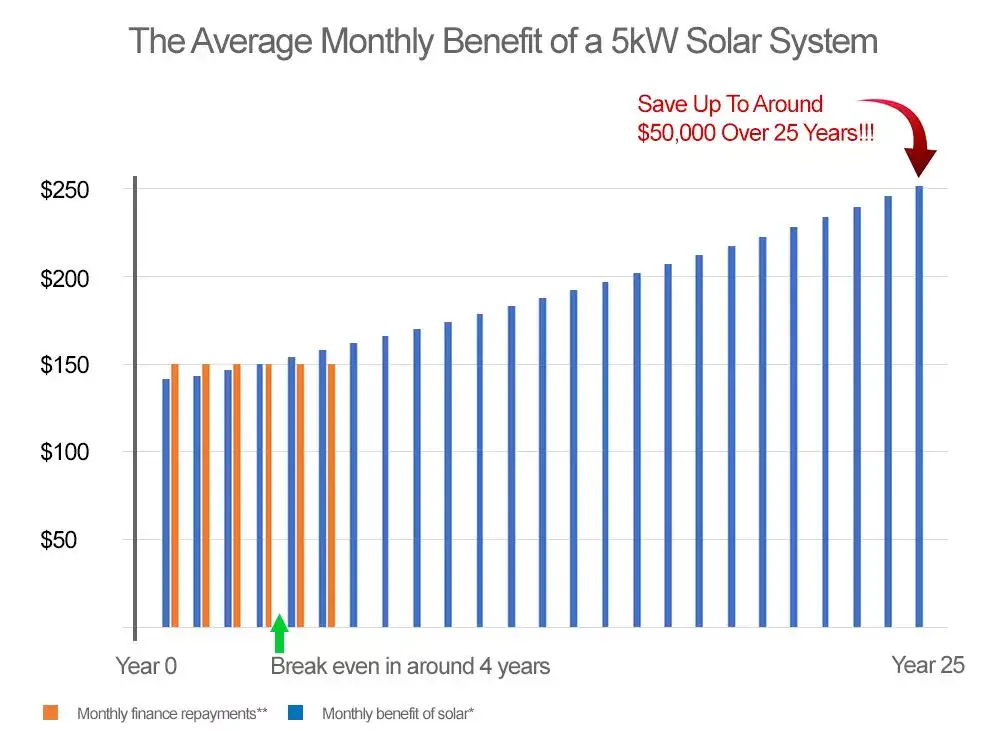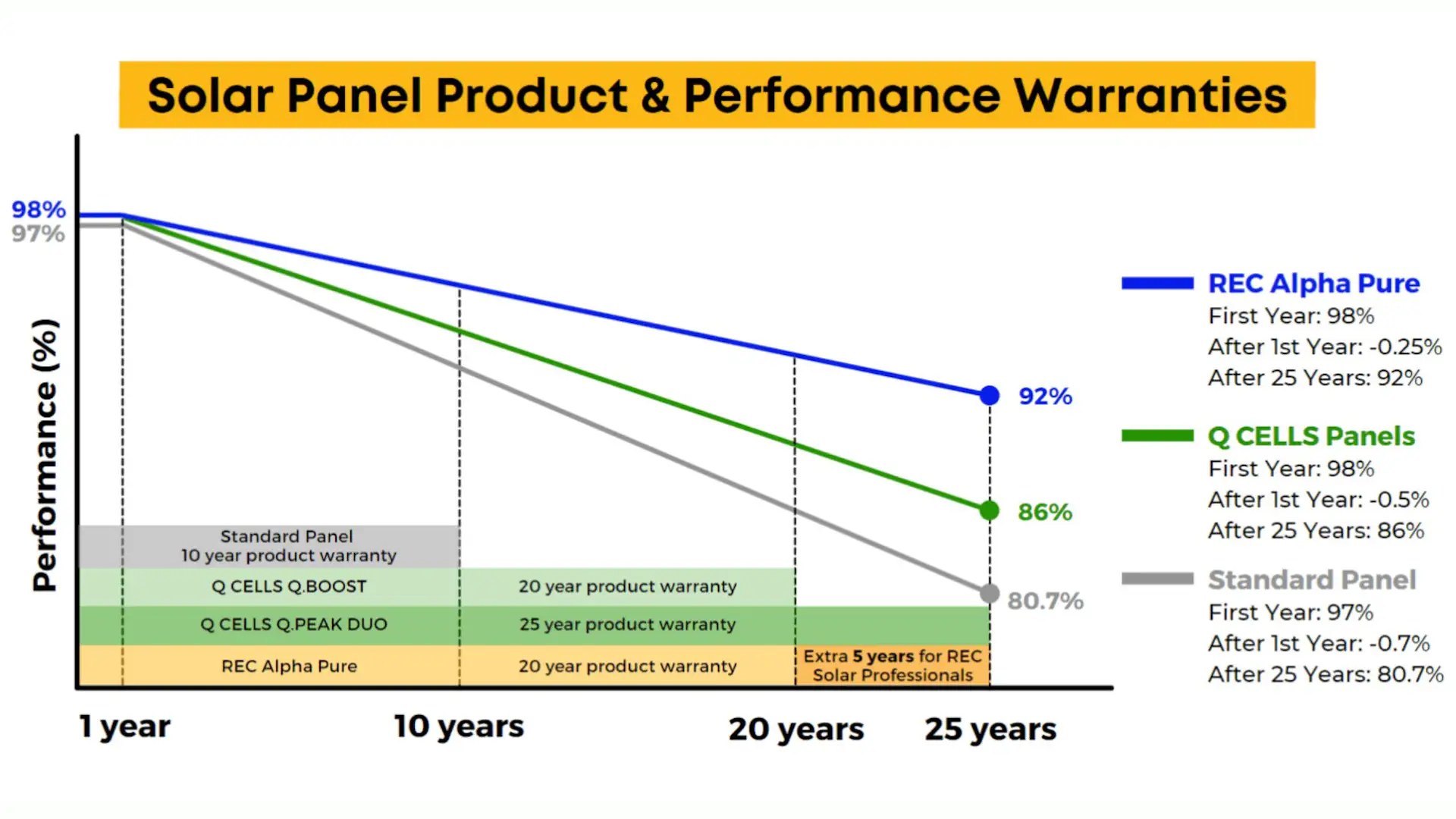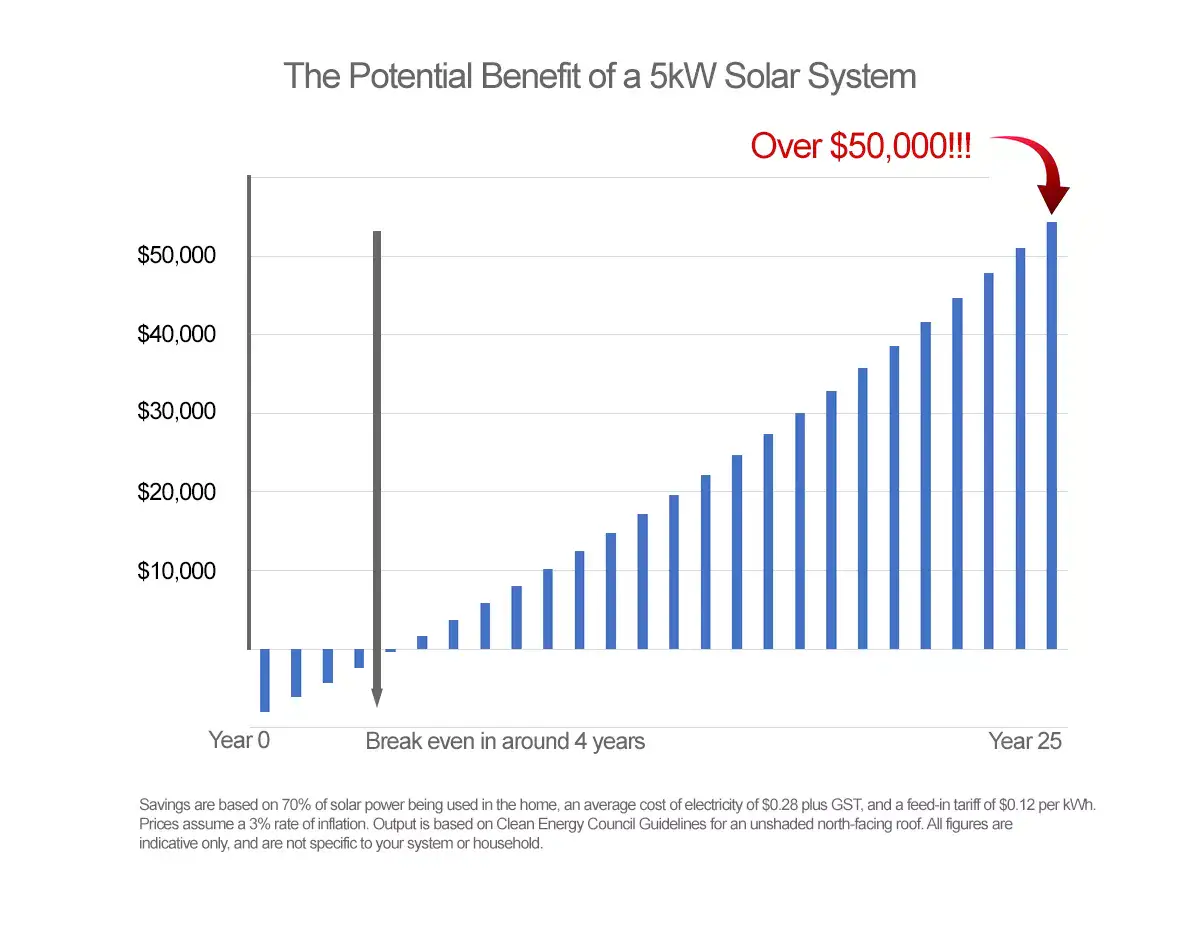Solutions
New Energy Solutions
Solutions
Brands
Solar Panels
Brands
Locations
About Us
About Us
Support
Need help?
Support
Learn
Featured Articles
Sizing Up A System
Finance & Rebates
Learn
NSW battery rebate now available. Find out if you're eligibile and request a free quote.
Contact UsA 5kW solar system in Sydney can significantly reduce your power bill by $400 to $500 per quarter.
The good news is that with decreasing solar panel prices, a 5kW system can pay for itself in just 3-4 years, even with a top-of-the-line system. This translates to potential savings of over $50,000 throughout the system's lifespan.

Choosing solar means you're not just saving money on your electricity bills. You're also making a positive impact on the environment. A 5kW system can significantly reduce your reliance on fossil fuels, which benefits Australia's renewable energy sector and contributes to a cleaner future.
Millions of Australians have already switched to solar power and for good reason. It's a smart investment that saves you money while helping the environment. Let's delve deeper into the details and see if a 5kW system is the right choice for your home.

While a 5kW system in Sydney typically generates around 20 kWh of electricity daily, the actual output can vary depending on several factors:
Roof Factors: These factors include both the direction (orientation) and slope (angle) of your roof. Ideally, south-facing roofs with a good tilt towards the sun will capture the most sunlight.
Shade Matters: Shading from trees, buildings, or even your chimney can significantly reduce your system's output.
Brand Quality and Installation: Higher-quality panels and inverters generally produce more electricity. Similarly, a well-designed and installed system ensures optimal performance.
This 20 kWh daily average is not constant throughout the year. Sunlight varies by season, so you'll likely see higher production in summer and lower production in winter:

Not sure what solar system size your home needs? Our inclusive guide can help you how to size up a solar system.
The CEC's annual output estimate of 7117 kWh is a conservative number. Based on our experience, 5kW systems often generate more.
Our data suggests that internet-connected Enphase systems with constant monitoring can produce up to 110% of their estimated output. This highlights the advantage of investing in high-quality brands.
Most solar systems have a lifespan estimated at around 25 years. This longevity is supported by the 25-year product warranties offered by leading manufacturers like REC and Q Cells Solar. Other brands typically provide 10-year warranties.
An additional layer of security comes from power output warranties. The image below shows manufacturers guaranteeing a certain percentage of power output for 25 or 30 years. It ensures your system continues to generate electricity efficiently throughout its lifespan.

Over time, all solar panels gradually lose efficiency. This degradation rate varies depending on the panel quality. High-efficiency panels, like REC Alpha Pure, typically degrade at a slower rate around 0.5% per year. Most other panels degrade at a rate closer to 1% per year.
It's important to consider how this degradation affects your system's overall electricity production. Central inverters connect multiple panels in series. If one panel in a string degrades faster than others, the entire string's output can be affected.
Microinverter such as Enphase offers a potential solution to this issue. Each panel in a microinverter system operates independently. So, degradation in one panel won't impact the performance of others.
To get a personalised idea of how much you could save with solar, consider these factors:
Electricity Cost: Check your power bill to see how much you currently pay per kilowatt-hour (kWh) of electricity.
Billing Type: If you have time-of-use billing, the average benefit of solar is estimated to be well over 30 cents per kWh you generate. With flat rate billing, the average benefit is around 30 cents per kWh you generate, plus GST.
Solar System Output: A 5kW system in Sydney, for example, might typically generate around 20 kWh of electricity per day. This estimate can vary based on factors like roof orientation and shading.
Multiply your electricity cost (kWh rate) by the estimated daily or annual output of your solar system to get a rough idea of potential cost savings.

A 5kW solar system typically costs around $6,000-$8,000 and can potentially lead to significant savings over its lifespan. This could translate to thousands of dollars saved on your electricity bills over 25 years.
This is just a general overview. We recommend you consult with a solar professional to get a customised estimate based on your specific energy needs and location.
Our solar experts will help you find the right system for your home.

Get all the right information before installing a solar power system for your home.
